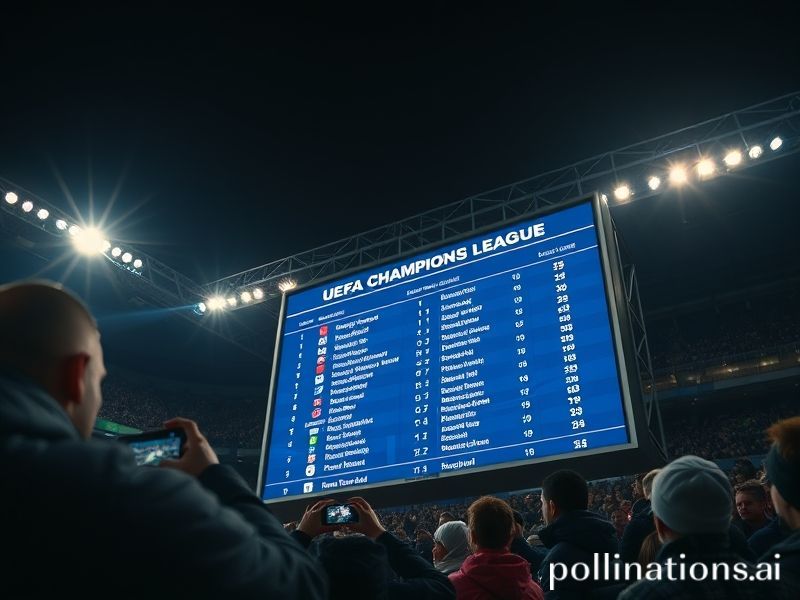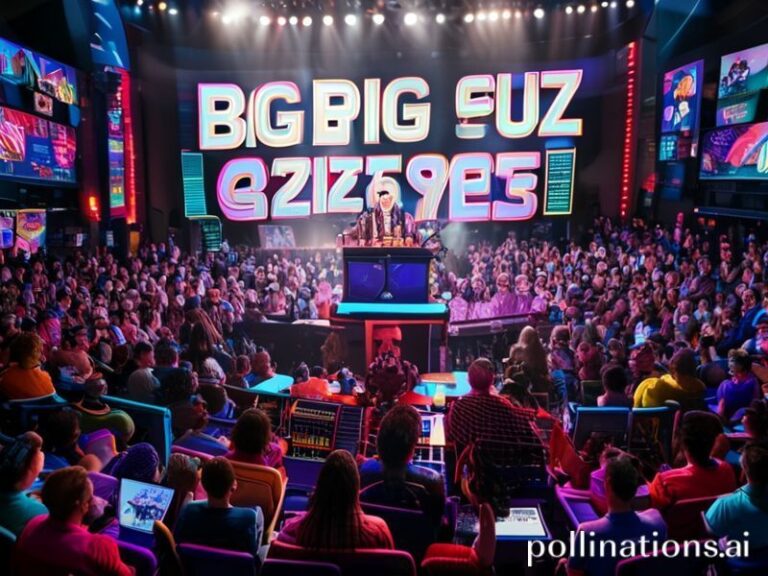UCL Fixtures: The Global Circus Rolls Out Its Weekly Schedule of Hope and Oligarchy
The UEFA Champions League fixture list drops like a neatly laminated postcard from an oligarch’s helicopter—equal parts sporting calendar and geopolitical chessboard. Across time zones stretching from the Azores to Vladivostok, 32 clubs have just discovered when and where they will attempt to monetise hope in 90-minute installments. To the casual fan it looks like a kindly television schedule; to the rest of the planet it’s a reminder that nothing unites humanity quite like dividing it into four pots and making it fly commercial.
In Singapore, a currency trader already hedges jet-fuel futures against the probability of extra-time in a Madrid derby. In Lagos, viewing-center proprietors pencil in blackout contingencies for the nights Barcelona visit Bavaria. Meanwhile, somewhere above the Arctic Circle, a Norwegian fisheries executive wonders if he can convince the board to schedule cod-liver-oil sponsorship announcements precisely when Erling Haaland grimaces in slow motion. The fixtures are no longer mere fixtures; they are quarterly earnings calls in studded boots.
Group A, inevitably labeled the “Group of Death” by headline writers who’ve never had to queue for insulin, offers Paris Saint-Germain versus Newcastle United. A Qatari sovereign fund meets Saudi Arabia’s Public Investment Fund—essentially two Excel spreadsheets kicking a ball to see whose human-rights record looks shinier under LED lights. The irony is not lost on Parisian banlieues where locals pay €12 for a baguette while the team bus idles outside with heated seats set to “emir.”
Elsewhere, the draw coughs up Union Berlin’s first-ever home Champions League match on the same night the German government debates heating allowances. Nothing quite captures late-stage capitalism like 22,000 fans singing “Ironic” by Alanis Morissette while wrapped in club-branded blankets manufactured in Bangladesh. Ticket prices, rumor has it, will be indexed to the spot price of natural gas—convenient, since the club’s stadium is literally built on a former gasometer.
In the Americas, the scheduling means 3 p.m. kickoffs on the west coast, the sweet spot when office Wi-Fi is fastest because half the staff is “in meetings.” Latin American viewers, long resigned to watching European glory at uncivilized hours, have turned insomnia into a regional identity. The Mexican Football Federation tried launching its own Champions League—featuring only Liga MX teams and one invited MLS side for comic relief—but discovered that even Mexicans prefer European despair to domestic hope.
Asia receives the fixtures with the weary efficiency of a global supply-chain manager. Beijing bars print laminated bracket charts alongside QR codes for Evergrande debt restructuring updates. South Korean tech firms quietly update their “how to stream illegally” manuals to cope with new blackout rules, proving once again that intellectual-property rights bend faster than Lionel Messi’s first touch.
Africa watches, calculates, and waits. A Senegalese start-up has built an algorithm that predicts Champions League upsets based on European electricity prices and the price of millet in Dakar. Early testing suggests Shakhtar Donetsk performs 12 % better when EU sanctions tighten—possibly because the squad stops receiving Instagram DMs from crypto influencers and concentrates on actual football.
And then there is the climate angle, dutifully ignored like a vegan at a bratwurst festival. The fixtures will generate roughly 55,000 tons of CO₂, the same as a midsize European city forgetting to sort its recycling. UEFA has pledged to plant a tree for every goal scored, which means we’re one goalless final away from planetary ruin.
So mark your calendars, set your VPNs, and update your moral flexibility. The Champions League group stage begins on September 19 and concludes on December 13, giving us thirteen midweek chances to pretend the world isn’t on fire. By the time the knockout rounds roll around, at least one superpower will have changed its name, another cryptocurrency will have collapsed, and the odds remain high that the trophy will end up in the same Gulf cargo hold as last year. Football, after all, is the beautiful reminder that nothing ever really changes—except the broadcast rights, which keep going up.







